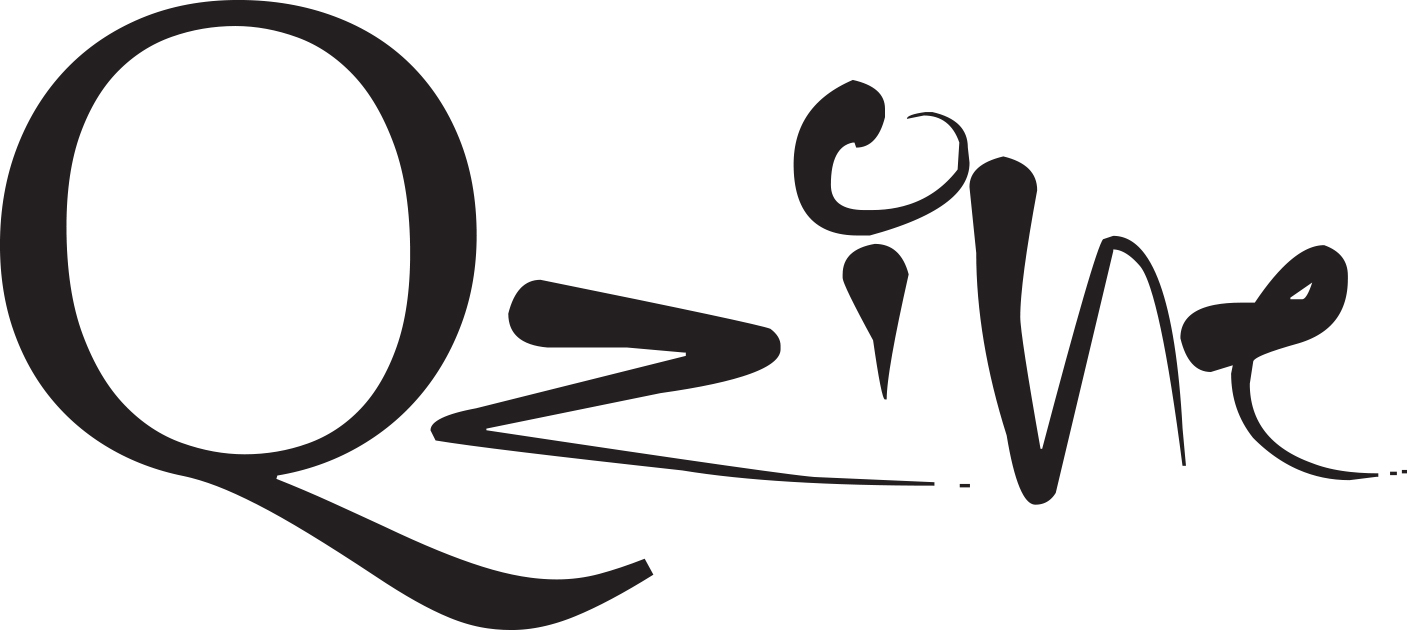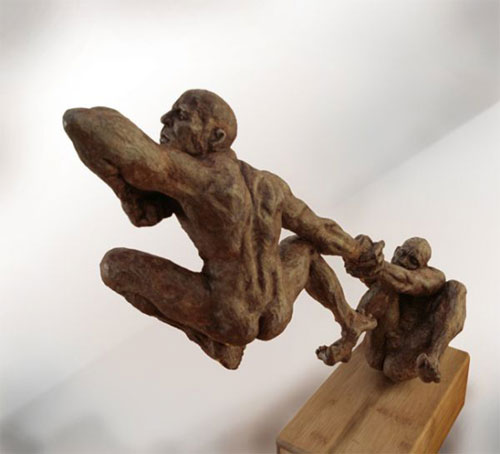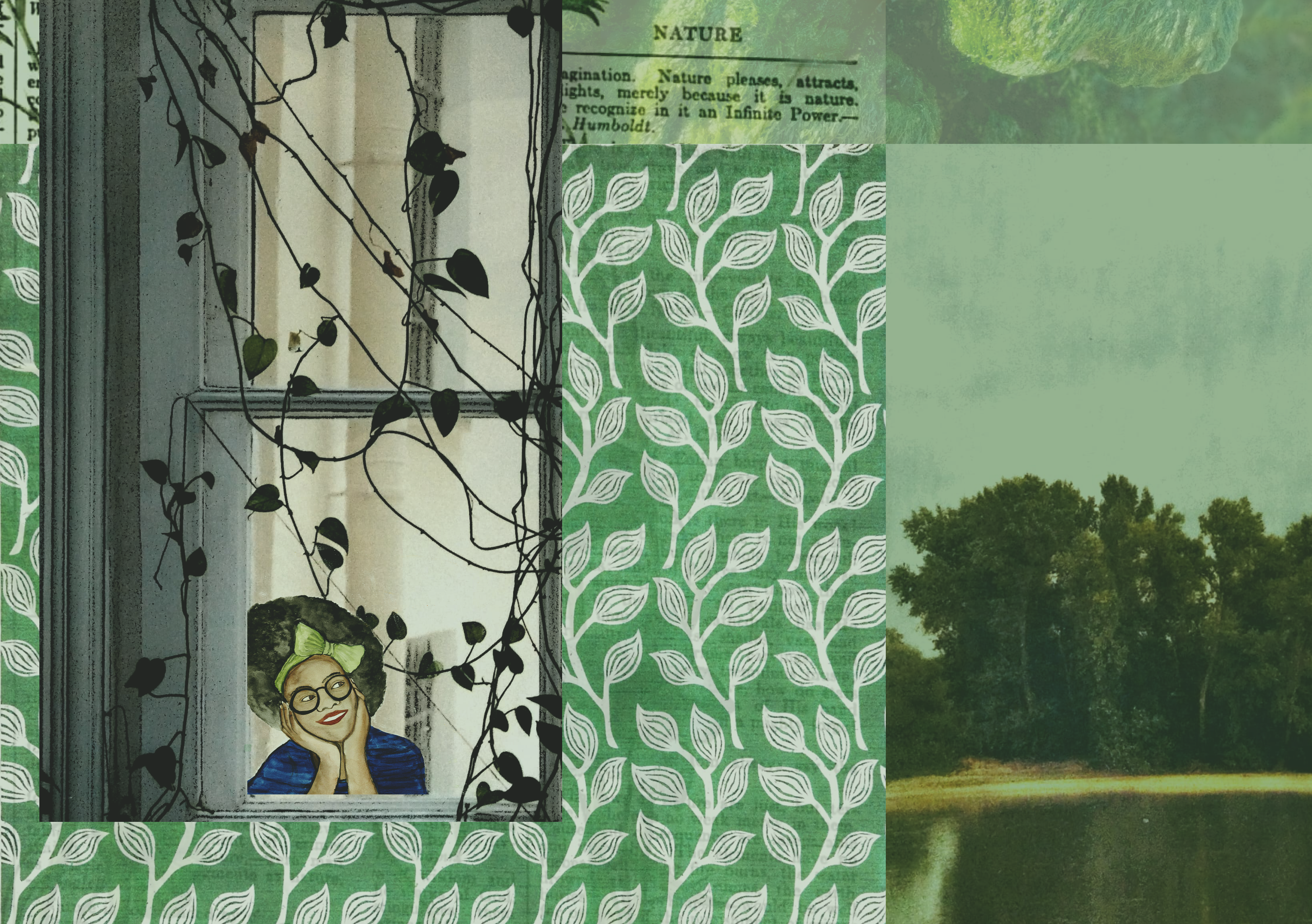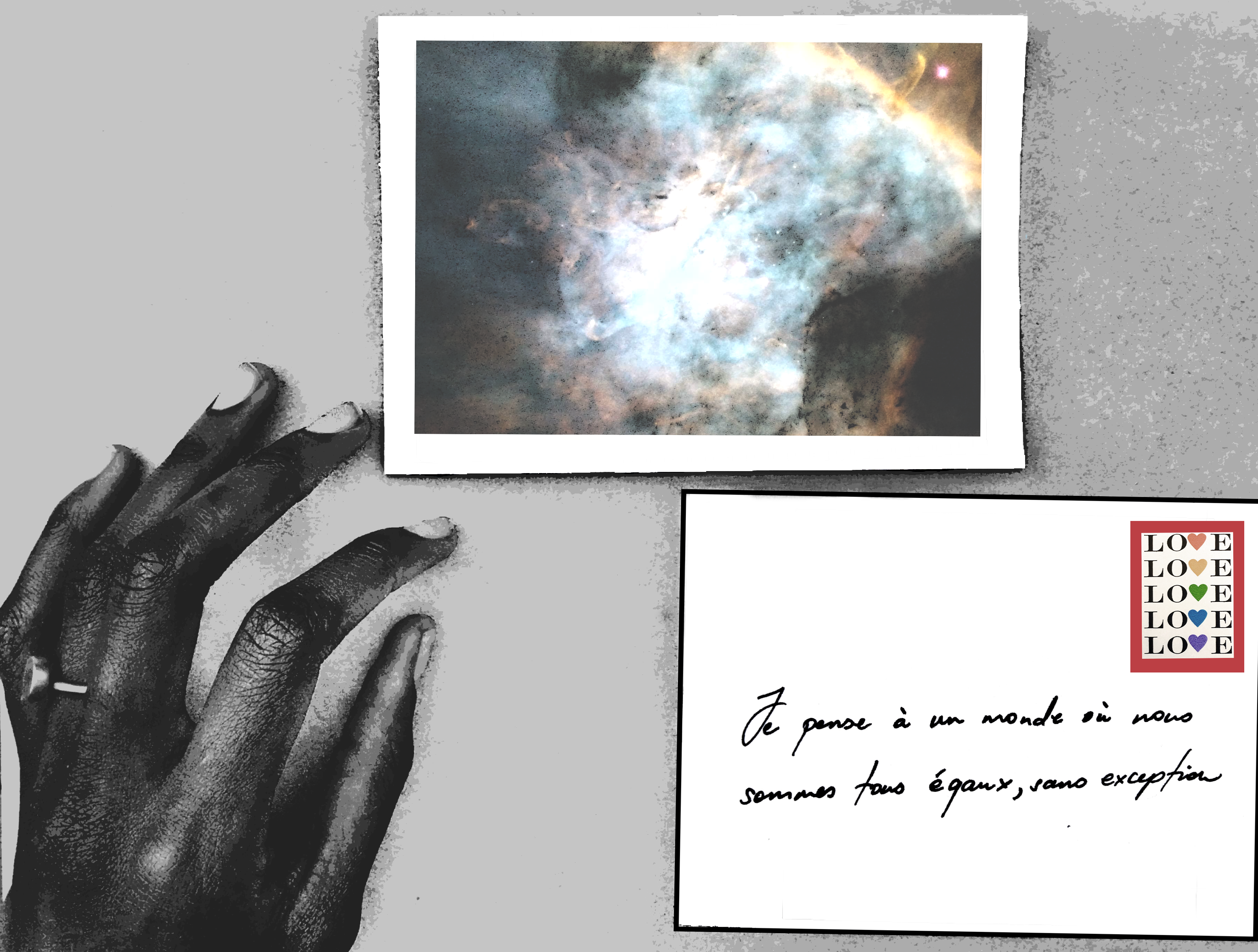Papa’s Tea
By Amber Butts
Illustration by Creative Powerr
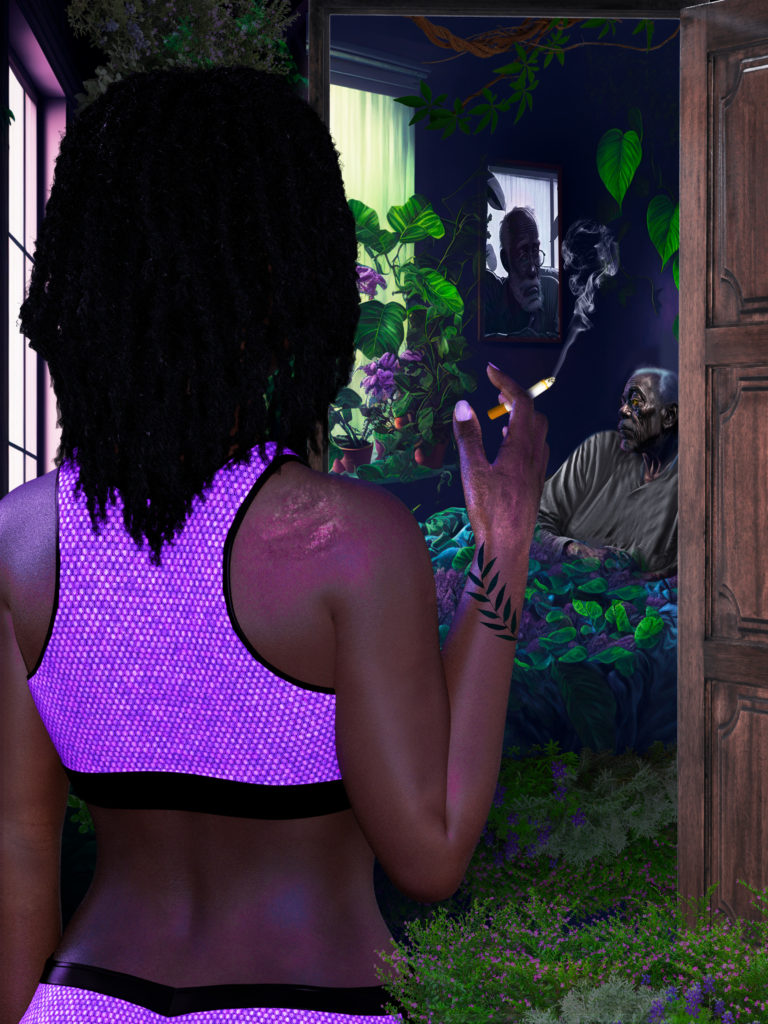
When your father first got sick and the whites of his eyes started turning yellow and your nightmares were filled with yellow eyes swallowing you whole, there was no one to tell. You’d wake up in cold sweats terrified. Your mouth aghast and dry. Your skin prickly. Your father staring at the altar with your grandfather’s picture on it. His loose skin sagging off of everything; the bed, the wicker chair, the couch, the old sweet potato gone moldy, your heart.
Your father doesn’t remember you anymore. His slow, loud, devastating breaths call out for his mother and never you.
Your hand curls around the mug you made for him before he was diagnosed with cancer. And he says, “Not that one.”
His nose reaches up in a sneeze as you fill a new mug with cinnamon tea and a splash of rum.
You imagine all of his memories come back. Or at least, the memory that you are his child. Or, that he knows you somehow.
You hug yourself quick and then let go, the warm frost of something gone and present and burning.
You take his talking as a sign. Let the steam paint a version of what you want this relationship to be where both of you are remembered without the pain, the long nights, the horse whistles, the silence. And without the medication that makes him scream late at night in terror.
Your mother is not here. And his is dead.
You imagine a glass mirror with a voice near worry, cradling you. Asking you to settle into yourself before the hollow road grabs your belly and shakes. This is a moment when you want to just be here. But there is no here, your father’s body sits jagged. An ocean of sadness. A relentless button made soft and gory.
When you were younger, your parents sang in a band. They liked to mix languages and dance on top of tables, with mouths full of food. And when that food fell, you were right there to pick it up and place it between your teeth or in an old handkerchief to feed the crawdads later on.
There’s a poultice you learned to make from your grandmother and your father asks for it, even when his skin isn’t swollen. One day you bring Mama Evette to him and she tells you, “Make your peace. He won’t last long.” She gives you three teas meant to last before he goes and you don’t give them to him because you are tired of everyone leaving.
Eventually you do though, because his eyes sag like pothos when they don’t get enough water or sun. But not before he develops jaundice and gout.
Because you have waited so long to administer the teas, they change color and taste bitter. You know you’ll need to go get more but for now you just want him to remember you. Want your name to touch his tongue and slip into memory. You want it to take hold. It doesn’t. Even when he’s confused.
So you go out and avoid the girl who tries to meet your eye. The girl who asks you everyday if you’re okay.
Oat tea is first on Mama Evette’s list. She says that your father will need it to fight his depression and fatigue. You’re used to the grain in bread, porridge and sometimes meat. But the tea has a dry flavor to it that makes your throat crack. It isn’t for you anyway, but you’ve made a habit of trying everything before you put it towards your father’s lips. You feel closer to each other like that somehow. He wasn’t a particularly good father. He barely paid you attention.
Since the stems have gone bad, you make it into a salve and put it around your neck, where the eczema is the worst. When your hand is returned to you, a layer of your skin is shining and flaky.
Because you’ve already chopped the leaves and put them into a flower jar, you search the house for a lid. As soon as you find it, you step onto a curved nail that sends your body convulsing like that one time Tia asked you to lift your arm and point at the telephone wire on Pino Street. And she grabbed the tip of your hand and pulled it down like lightning. You wail, but only on the inside because your father is in the next room and he still doesn’t know who you are.
You feel closer to each other like that somehow. He wasn’t a particularly good father. He barely paid you attention.
After cursing, you grab the rest of your tequila, pour some into the bottle top and use it as a suction device. While you wait for it to do its thing, you take three swigs. Then you fill the jar with leaves and pour tequila until everything is a bath. You close the top, but because you don’t know how long your father will last without it and you can’t wait two weeks for it to hold, you bury it underneath the loose floorboard in the living room, shaking it once a day.
You leave for the afternoon. When you return, you have the freshest oat leaves you’ve ever harvested. You wrap them in string and flip them upside down. Letting them hang above the sink in the kitchen, near the broken cabinets and starfruit. The fruit flies dangle beside you but don’t attempt to approach the oat.
While you wait for them to dry, you make a small tincture that sedates your father. Within 48 hours, you have to double the dose. He never falls asleep but he does stop asking for his mother. Yes, your face is still hers so this is a sort of remembering you think. But then he stops asking for her too, even when you get close to his face and wipe the drool off his chin, the spittle dancing in groups.
Wood hunters find orange-leaf nightshade the easiest because they are always out. So you ask the girl to gather it for you. She says you’ve never asked for her name. You don’t ask now. You also don’t miss the way her body jumps out for a split second before she turns around sharp like a wolf. Her eyes alight and swaying. You ask her what that was and she shrugs. You don’t have time to wonder.
Mama Evette started to tell you what the nightshade was for but you knew already. It helps prevent cancer cells from regenerating. And yes, you already know that your father’s ailments are beyond cell regeneration, but he doesn’t keep food down and you think this might provide some kind of relief.
If gathered correctly, the berries can even be made into a pie. When cooked, the viciousness of poison decreases substantially and turns into a bittersweet syrup. The initial smell is still poisonous, so anyone who cooks it is recommended to do so outside. Last year, you cooked it inside, biting into the still warm nightshade pie and nearly died.
The tumor outside his belly is bathing in a honeysuckle salve. And he blames you for trying to save him when all he wants to do is be left to die. You know that. He calls you a name you don’t know and asks you to stop making him tea.
You decide to make nightshade tea instead of pie just to be safe. You put gloves on to remove the stickers because they’re also poisonous. You miss one of the stickers later on and it pokes you. So you sit waiting to die again on the prickly floor.
You don’t die.
The berries are still in the bowl and the water is cold now. You light a fire again and start the process over. By the time you get the tea to your father it’s late and you’ve forgotten to soak the leaves in oil. Had you done that, they’d have helped purify what blood he has left and prevent seizures.
You can find honeysuckle anywhere. Your father’s pancreatic cancer has traveled to his stomach and now blood. So you place the honeysuckle on some paper in the oven and dry the leaves for five minutes. His voice comes back for a while and he sings a song you don’t know. But it makes you sad anyway. Makes you miss your mother and everyone else.
When he sings, he keeps his eyes wide open and you swallow a fist sized lump in your throat every time.
The tumor outside his belly is bathing in a honeysuckle salve. And he blames you for trying to save him when all he wants to do is be left to die. You know that. He calls you a name you don’t know and asks you to stop making him tea.
Actually, he throws his mug towards you and the hot tea makes a welt the size of a sword below your navel all the way to your foot. His eyes are wide like when he sings and you stagger back, suddenly woozy. You eventually give him three times the dosage of oat tea and he falls asleep, mouth as wide as a gulf. And you imagine covering his mouth for the rest of the night.
You still have the honeysuckle berries. Their poison laughing at the base of your neck, the way the fruit flies gallop towards the great seed. You eat one of the berries and wash the bright fleshy taste down with some tea hoping that you won’t wake up.
When you wake up the next day, your door is ajar and your father who hasn’t gone to the restroom without you in five years is staring at your feet. He isn’t wearing what you put on him three days ago and his mouth is plasma, star rocket, clutter. You think one of the tonics has stimulated his muscles, allowing him to get up. You shuffle to your feet, convinced he’ll fall soon.
As you lift your body, a large cluster forms in front of your eyes and you start to vomit. It gets everywhere and for a few moments you’re choking. You’re choking and blood is rushing to your head and you want one breath to come out even if it means it’s your last one. And for some reason the girl is there then. A slow smile spreading across her face and a quick knuckle to your back like a storm.
You wake up like that. A storm, a bucket, a sheet and an echo. Your father is still asleep after you’ve cleaned everything up. Your throat is raw and you know you should drink some tea or water but you don’t. All you want is to climb into the river of her hair and braid a knuckle into her skin.
When you lift out of the bath and lotion your back, you see the bruised shadow of a fist near the tea leaf tattooed into your skin. The mirror shakes against the floor and you’re ready for it to fall, ready for everything to shatter finally.
You had the tattoo done five years ago. That was before your father was sick-sick. You had friends then and were supposed to get it cleaned that same year with them but your wants shut up like a clam a long time ago. And no one wants to be around a clam.
When you had asthma, your mother’d change up her honeysuckle tea recipe:
1 spoonful of fresh honeysuckle flowers
2 spoonfuls of mullein
2 cups of honey
4 boysenberries
You still have a half jar of the last one she made. The times when you can no longer take missing her, when your skin aches and you start convulsing, you ration out one spoonful and mimic the way she’d put it in your mouth. At first you are embarrassed for doing this. You wonder what people would think if they saw you like that. And then you stop caring because she was your mother and no one watches you now but the bluejays at the window. No one checks on you anymore.
Your father is finally awake and the spittle on his gown is near dry. You decide to make him bread without yeast because it’s one of the only ways he’ll take his pills now. He knows they’re in his food, but he still wants it this way. You imagine his pills melting like his memory, picture the bright spots fading on his brain. You wonder like you’ve wondered for the last several years who will die first. And how.
You give him some more rum tea as you wait. Once the bread is done you roll it into nine balls (one pill at the center of each ball) and place some miso soup in front of him. He dips it and smiles stupidly as you go outside to take a hit of your cayote tobacco.
The breeze immediately cools the hot pang belting up inside you. You sit on the half rotted weaving chair, thinking of the shape of the basket in the kitchen and the girl’s smile. This mixture makes you dizzy and a quick whoosh has you giggling. You didn’t pound this tobacco yourself and somehow that makes it better. You go inside to find your father snoring at the table, all his food gone. You take him to his room and lay him on his side, scribble a quick note (“I’ll be back in two hours”) and kiss his forehead. As if he will remember. As if he can read.
By the time you get to the last spot you saw the girl, there is no pain in your body and you feel like running. So you do. The tobacco makes you feel alive and light like smoke from a hot fire people are always trying to plug. You stop thinking about that. You let your legs move up and down, let them burn and fill your belly, your breath hot and shining.
You don’t leave yet. You turn her body over in your tongue and wait for all of her to pour out. When she does, she tastes like nettle leaf and slippery elm.
And then the girl is there. And then you are in her bed. She holds the knife underneath her pillow in her left hand and when you squirm to move to the other side you’re all at once awake and remembering your father. She doesn’t even open her eyes when she tells you that you can go. She says she knows.
You don’t leave yet. You turn her body over in your tongue and wait for all of her to pour out. When she does, she tastes like nettle leaf and slippery elm. You remember their benefits:
Soothes sore throat
Reduces inflammation
Lowers blood pressure
Heals burns
Helps with diarrhea
Then you remember the first time you had it. Your mother outside over a pot with what looks like pieces of tree bark. Her face awash and colicky. Her skin blistered, voice feeble, smile gone. The trees around her not moving. Your body stone.
And you run from the girl’s house into your own. Your father is coughing, you hear it before you get inside. The oven is not on but you see stars anyway. He looks at you then. Eyes wild and alive.
And starts to sing.
